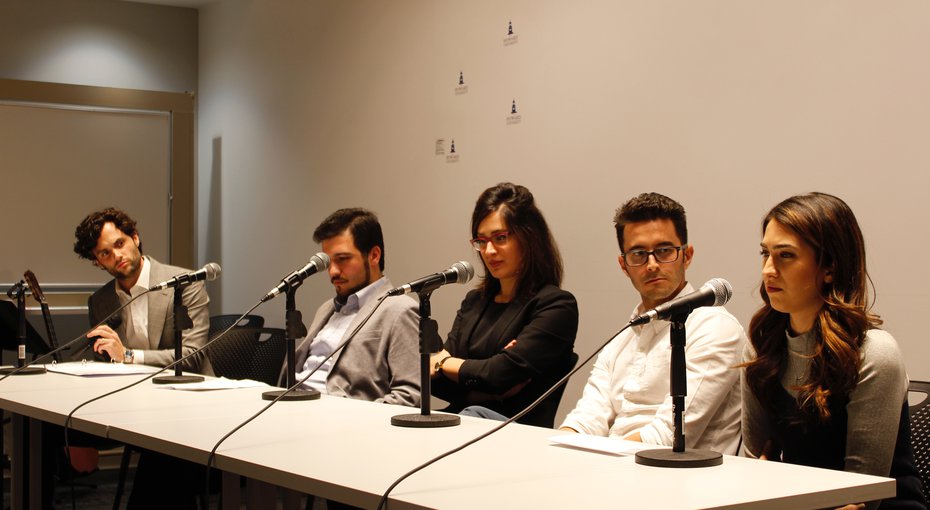Source: www.iranwire.com

On the evening of October 18, 100 people gathered at Howard University, a historic African-American center of higher education in Washington, DC, to hear the actor Penn Badgley in conversation with Iranian Baha’i former students, who talked about their experiences of being excluded from higher education by order of the Iranian government.
Mr. Badgley, known for his leading roles on television shows such as Gossip Girl and You, addressed the audience in his introduction to the evening, highlighting the obstacles Baha’is face when attempting to attend university.
“This evening,” Mr. Badgley said, “you will all be introduced to a set of truly exceptional people. Each of them is a Baha’i, each was born in Iran, and each grew to understand the obstacles that would be imposed between them and their education by an oppressive government.”
“And, each of them,” he continued, “at great personal risk, decided to pursue higher education anyway, bringing a spirit of courage, improvisation, and perseverance that would be a credit to any country that recognized and nurtured their talents. We are honored to be among them tonight.”
The students, Ms. Niknaz Aftahi, Ms. Nasim Biglari, Mr. Holakou Rahmanian, and Mr. Shakib Zabihian, all shared testimonies about their experiences as Iranian Baha’i students, as well as the subsequent success they achieved after moving to the United States.
For many Baha’is, Ms. Aftahi recalled, their first experience of persecution occurs in the education system, often in primary school.
“One day during Islamic theology class, when I was 10, the teacher asked everyone in the class, ‘who is not Muslim?’ I raised my hand and she then asked me about my religion. As my mom had taught me initially, I did not mention the word Baha’i — it is a taboo word in Iran and some people are very sensitive to it — and I said ‘I belong to a minority religious group that is not officially recognized in Iran.’ She then insisted that I say in the class what that religion is, and I eventually said that I am a Baha’i. She got mad and asked me to leave the class. Later she asked our school principal to expel me from school and warned them she would not teach the class as long as a Baha’i student is present.”
Mr. Zabihian, who has started a successful educational company in California since leaving Iran, spoke of the reasons why Baha’is apply to university despite knowing they will be unable to attend.
“According to the constitution [of Iran],” he said, “we all have the right to get an education, but we knew that we wouldn’t get in. You have to make the best of a bad situation, so we tried anyway, and didn’t deny ourselves the chance.”
“Constitutionally,” he continued, “you have that right. If you don’t apply for universities, or don’t take the [entrance exam], then you can’t really say that you are being denied that right.”
“There is always the hope that things will be different this year,” added Rahmanian.
Mr. Rahmanian, who was was denied entry to university in 2007 after placing 54th on his entrance exam out of about half a million prospective students, described the disappointment of discovering he had been rejected because of his faith.
“I logged in and saw one big, red phrase: ‘rejected.’ I couldn’t believe it, it didn’t make any sense. When I went to the National Exam Board to ask why this was, they told me very clearly that it was because I was a Baha’i.”
Ms. Biglari spoke to the support she felt from her friends during her time in Iran.
“During the hard times that I was going through,” Ms. Biglari said, “I had Muslim friends that gave me the emotional support that I really needed. I was jailed because of being Baha’i, and I was being interrogated, and I was going through a tough time personally, and it meant the world when I heard after I was released that all my Muslim friends had been praying for me.”
The event also featured remarks from Mr. Hamid Gharagozloo, the US representative for the Gonabadi Sufi community, which faces similar educational persecution in Iran owing to their religious beliefs.
“More than anything else,” Mr. Gharagozloo said, “the government is afraid of educated people. They are afraid of free thinkers.”
“[Gonabadi Sufis] are Shi’a Muslims, and yet still we are persecuted by the regime.”
October 23, 2018 5:05 pm
Baha’i’s believe in compulsory universal education. If a parent has only enough funds to educate one child the daughter must be educated not the son, because she will be the mother of next generation. Mothers are the first teachers of children. My dad, Alimohammad Hashemi, MD was fired from his government job and lost 11 years of pension, because he was a Baha’i. He continued to see patient in his office and although he could not collect the insurance payment because of his religion, he lived on the co-pay. He served the community with great care and saw many patient free of charge and even pay for their medication for over 45 years.
I was lucky that I could move to US to finish my higher education.